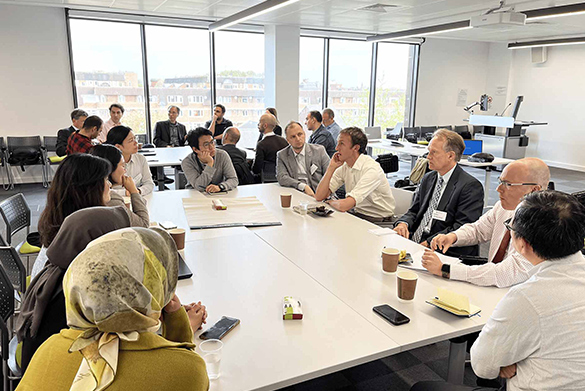Centre for Supply Chain Research hosts workshop on port city decarbonisation and economic revitalisation

On 18 September 2024, the School’s Centre for Supply Chain Research (CSCR), hosted an interactive industry workshop with McMaster University to uncover the environmental and economic benefits of creating more sustainable and resilient maritime, railways and intermodal transportation systems.
The event, which drew over 30 delegates, aimed to find out how industry, universities and the public sector can work together to decarbonise and economically revitalise port cities and their hinterlands, with practical examples from Hamilton (Canada) and Liverpool.
The workshop is part of the wider project ‘Transport Decarbonisation for Next-Generation Ports and Port-City Hinterlands’ funded by the Global Partnerships Fund, a strategic partnership between the University of Liverpool and McMaster University to support the development of collaborations in areas of complementary research strength.
Dr Cagatay Iris, who leads the collaborative research project in conjunction with fellow CSCR experts, Professor Tolga Bektas and Professor Dongping Song, shared the importance of delivering transport decarbonisation along with economic revitalisation in Liverpool.
Cagatay discussed relevant current projects of the University, such as the Green Shipping Corridor between Liverpool and Belfast and the UK National Clean Maritime Research Hub, as well as the Global Partnership Fund key goals.
Partner researchers from McMaster University, Professor Moataz Mohamed, Professor Mark Ferguson and Mr Ken Albright, spoke about Canadian freight clusters, the general outlook of railway infrastructure and the fundamental aspects of decarbonisation in Canada, specifically in Hamilton.
Representing Canada’s private sector, Ian Hamilton shared his expertise and operational insights as President and CEO of Hamilton-Oshawa Port Authority (HOPA), an integrated port network.
Ian highlighted HOPA Port’s aspirations for transport decarbonisation by prioritising sustainability and investing in infrastructure to further develop innovative port and marine assets.
Key figures from Liverpool’s maritime network also shared first-hand insights and best practices with the delegates, as well as how their organisations contribute to the decarbonisation and revitalisation efforts of the city.
Matthew Wright, Policy and Regulatory Affairs Manager at Freightliner Group Limited, explained how enhancing rail freight systems and infrastructure can deliver economic and environmental benefits to the Liverpool City Region (LCR), as well as Freightliner’s long-term aspirations to contribute to the economic revitalisation of Liverpool as a port city.
Group Head of Sustainability at Peel Ports Shaun McKenna emphasised the port’s role in the city and how the transition to a sustainable port can bring about sustainable and economic opportunities for LCR.
Ruth Wood, CEO at Mersey Maritime, provided details of how their organisation acts as an enabler of decarbonisation within LCR, delving into Mersey Maritime’s sustainability projects.
Participants then engaged in a roundtable discussion, where they examined and debated over opportunities, best practices, barriers and supply chain impact on transport decisions for decarbonisation and economic revitalisation.

